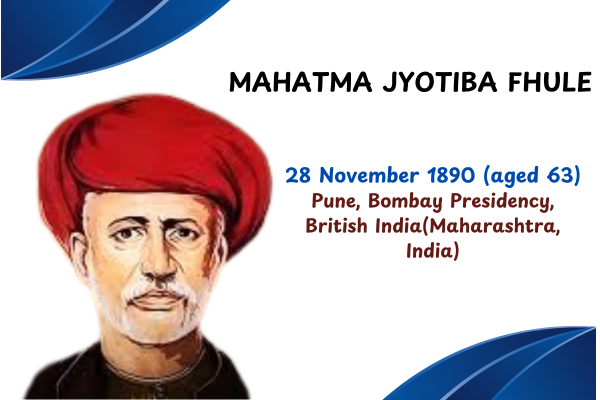Mahatma Jyotirao Phule (1827–1890) was a visionary social reformer, educator, and thinker who played a crucial role in challenging the deeply entrenched social hierarchies and caste-based discrimination in 19th-century India. Phule is best known for his relentless efforts to uplift the marginalized sections of society, particularly women and lower-caste individuals, and for laying the foundation of modern education in India. His contributions have left a lasting impact on Indian society, inspiring numerous movements for social justice, equality, and education.
Social Reforms and Advocacy for Lower Castes
Phule’s primary mission was to challenge the oppressive caste system and the discrimination it entrenched in society. He was particularly concerned with the condition of women, untouchables (those in the lowest rungs of the caste hierarchy), and other marginalized communities. The prevailing social order, which was supported by religious orthodoxy, relegated women and lower-caste individuals to lives of subjugation, denying them basic rights, education, and freedom.
1. Education for All
One of Phule’s most significant contributions was in the field of education. In 1848, he and his wife, **Savitribai Phule**, opened the first school for girls in Pune, breaking a major barrier in a society that restricted girls’ education. Phule’s progressive vision saw education as a tool for social change, particularly for marginalized groups who had been systematically denied the right to learn.
– Phule also advocated for the education of lower-caste individuals. In an era when Brahmins dominated the educational landscape, Phule was a strong proponent of spreading education to the untouchables, who were denied access to formal schools. He started the **First Native Girl’s School** and schools for the children of the lower castes, paving the way for universal education.
2. Opposition to Brahminical Patriarchy
– Phule was a fierce critic of the Brahminical order and the religious orthodoxy that reinforced caste-based discrimination. He opposed the rigid caste system, which had been institutionalized by religious doctrines and practices, and which denied equal opportunities and rights to the lower castes.
– He founded the **Satya Shodhak Samaj** (Society of Truth Seekers) in 1873, an organization dedicated to the promotion of social equality, education, and the eradication of caste discrimination. The society aimed to expose the exploitation of lower castes by the upper castes and to encourage people to challenge the social inequalities that had been perpetuated by centuries of Brahminical control.
3. Women’s Rights and Empowerment
Phule was a pioneer in advocating for women’s rights. At a time when women were considered the property of men, Phule not only championed their right to education but also called for the improvement of their social status. His work with his wife Savitribai Phule in running schools for girls was groundbreaking.
– He also campaigned against child marriage, the practice of Sati (the burning of widows), and female illiteracy. He argued that women, especially from lower castes, were the most oppressed group in society and required education and empowerment to challenge patriarchal norms.
4. Critique of Hindu Scriptures
Phule was critical of the religious texts, especially the **Vedas**, which he believed were written to perpetuate the dominance of the upper castes and to oppress the lower castes. His book, **”Gulamgiri” (Slavery)**, published in 1873, criticized the exploitation of the lower castes by the upper castes and condemned the caste system as a tool of social oppression. This book was one of the first in India to question the role of religion in perpetuating inequality.
Phule’s Influence on Indian Society
Mahatma Jyotirao Phule’s work laid the foundation for many of the social reform movements that followed, including those led by figures such as Dr. B.R. Ambedkar and Periyar E.V. Ramasamy. His advocacy for the rights of marginalized communities, particularly Dalits (untouchables), women, and the lower castes, continues to inspire social justice movements in India.
Phule’s insistence on education as a means of liberation helped shape modern Indian society’s understanding of education as a fundamental right, rather than a privilege reserved for certain castes or classes. His contributions to the field of education, especially for women and Dalits, have had a profound and lasting impact, paving the way for greater inclusivity in Indian schools and universities.
Legacy and Recognition
Jyotirao Phule’s contributions to social reform have been recognized and celebrated posthumously. He is regarded as a visionary who worked tirelessly to break the shackles of caste-based discrimination and promote equality. His legacy lives on through the various institutions that he helped establish, his writings, and the ongoing struggle for social justice that continues in India.
– Phule’s Role in Modern Education: His pioneering work in girls’ education and the education of marginalized communities played a significant role in shaping India’s educational policies. Today, Phule’s name is associated with numerous schools, colleges, and educational programs dedicated to the empowerment of women and marginalized communities.
– Statues and Memorials: Statues of Jyotirao Phule stand in various parts of India, and his birth anniversary is celebrated as a day of social awareness, education, and equality. His life and work have been the subject of numerous books, articles, and films that highlight his vision of an equitable society.
– Honors: Jyotirao Phule was posthumously awarded the title “Mahatma” due to his exceptional contributions to social reform. His wife, Savitribai, is also remembered for her pioneering work in education and for her role in supporting her husband’s vision of a just society.
Conclusion
Mahatma Jyotirao Phule was a towering figure in the history of Indian social reform. His life’s work focused on uplifting the oppressed and advocating for social equality, particularly through education. By challenging the rigid social structures of his time, he helped spark a movement for social change that transcended the boundaries of caste, gender, and class. Phule’s efforts continue to resonate in contemporary discussions around social justice, equality, and education in India. His legacy remains a powerful reminder of the importance of education and the fight against social injustice in creating a fair and equitable society


WAH BAHUT BADIYA
thank u sir